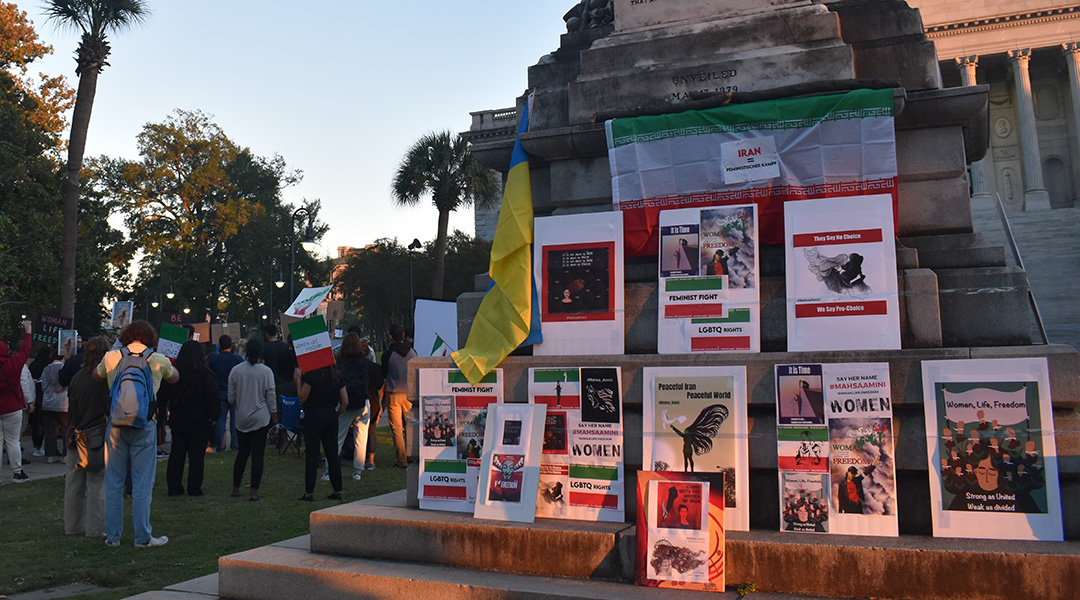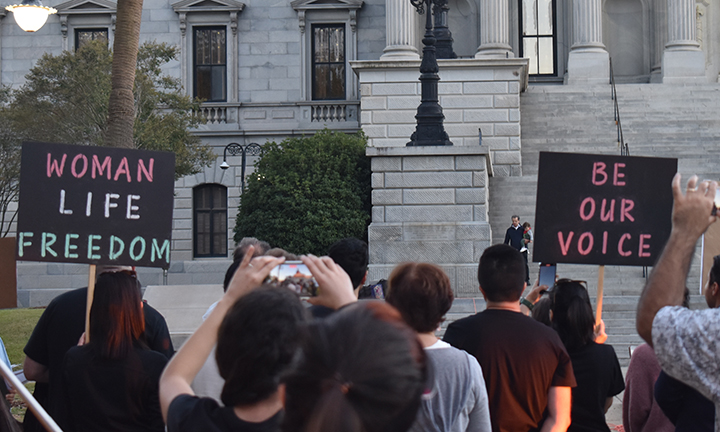Members of USC’s Iranian Student Association demonstrate in front of the S.C. Statehouse. Attendees carried or set up signs around the area. (Photos by Dylan Ortuno)
Members of the Iranian Student Association at USC demonstrated Tuesday evening at the S.C. Statehouse, advocating for social freedoms for Iranian women.
Mahsa Amini, an Iranian woman, was found dead Sept. 16 after being detained by the country’s morality police for “wearing her veil too loosely,” according to the Associated Press news service.
In response, Iranians in many countries around the world have protested.
The University of South Carolina’s Iranians, who gathered at 6 p.m. on Tuesday, expressed their outrage while not revealing their names because of fear of possible retribution.
“Words cannot begin to express how furious and enraged I feel these days,” a female Iranian speaker said at the demonstration. She continued, praising the work of those who have protested after Amini’s death and calling for action from her peers to support Iranian women.
Another Iranian speaker, a male, said that he was frustrated to the point that he didn’t care about any potential Iranian government threats toward him. He said now was his time to take action and say something, otherwise he couldn’t expect anything to change.
Throughout the night, different speakers chanted with the crowd “women, life, freedom.” The phrase is a slogan Iranians are using for this modern women’s rights movement.
The group emphasized the need to spread awareness now more than ever.
“The attention is very crucial because our state politicians, like Lindsey Graham and Jim Clyburn, are very powerful people in the United States Congress,” said the student group’s faculty advisor, Mostafa Mobli, who is an American citizen. “We want to show them that there is a constituency in South Carolina who are paying taxes, who are voting, who want their attention and need them to do something — at least say something.”
Mobli said South Carolina politicians’ involvement in international politics were a factor in deciding to demonstrate at the State House.
Toward the end of the demonstration, Mobli assembled the group to chant “women, life, freedom,” and other chants, both in English and Farsi, Iran’s official language, to cars and passersby along Gervais Street in downtown Columbia.
Though the students generally gathered as a result of Iran’s mandatory Hijab law and Mahsa Amini’s death, the demonstration addressed the country’s general oppression of women, said another professor whose family lives in Iran and who didn’t want her name used for fear of recrimination.
“It’s about the right to live however you want in (Iran),” another Iranian student told the Carolina News and Reporter earlier in the day.
In Iran, the student said, women have numerous rules they need to follow that inhibit their freedoms. Women, for example, can’t go to a university or work without their husband’s or father’s permission, can’t file for a divorce and can’t gain custody of their children if the father is ill or incapacitated.
Despite the severity of the issues, some of those going to the demonstration think not enough people are aware of the problems.
“Though Columbia, South Carolina, or any other city in the United States may not be able to do anything significant that would create material change in Iran, they can show their support to us and make us feel like we belong in this community,” the professor said. “But that hasn’t happened yet.”
The professor said colleagues, friends and others have showed little to no awareness of the issues. Those who did know, even the ones who would actively advocate for other social issues, only reached out to learn more. The professor said people in the United States are struggling and no one is checking on them emotionally.
The lack of advocacy from others “makes me ask why,” the professor said. “Why aren’t we being seen, why aren’t our problems being recognized? We will only achieve equality, justice or fairness in the world if we’re in solidarity with each other for all the marginalized people in the world. Not just who we feel deserves care the most.”
Conditions in Iran in the past few days have made it difficult for the students to reach out to their family members, several people said.
Mobli said that several of the attendees have family members who have lost internet access, gotten physically harmed or been abused as a result of their protests against the government. He said that for their sake, Iranians must continue rallying together in support of women’s rights.
Before ending the demonstration, attendees were instructed to visit this link. Through that webpage, people could learn more information about the movement and find ways to contribute beyond the evening’s protest.




